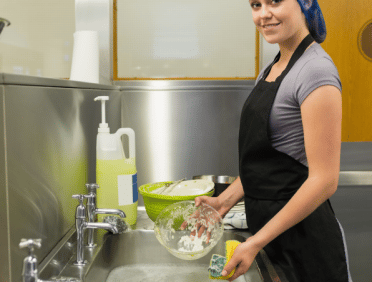What is food hygiene in terms of food safety?
Food hygiene is an important part of food safety that includes procedures and techniques to ensure the cleanliness and safety of food during manufacturing and consumption. It entails personal hygiene, keeping a clean environment, safe food handling, temperature control, allergen management, and sanitary food preparation.
How important is food safety in business?
Food safety is extremely important in any food-related business. Beyond legal compliance, it is critical for protecting public health, establishing consumer trust, upholding a favourable reputation, assuring operational efficiency, and boosting employee morale. Commitment to food safety is critical to the industry’s long-term success and resilience.
Who is responsible for food safety in a food business?
Food safety in the food industry is a shared responsibility with multiple roles. Management and owners are responsible for fostering a food safety culture, while specific jobs such as food safety managers, chefs, kitchen workers, front-of-house staff, and compliance officers contribute to various parts of ensuring safe and sanitary food procedures.
All employees have an important role in following cleanliness measures and upholding food safety regulations.
The significance of Ensuring Safety in Every Culinary Endeavour
Running a successful food business in the UK requires mastering the art of delightful foods as well as navigating the complex environment of food hygiene and safety. We will examine the regulatory framework, legal requirements, and the critical significance of food safety in determining a company’s reputation and success.
Regulatory Landscape for Food Hygiene Safety
The UK is proud of its rigorous food safety standards, which protect the public from possible health risks linked to food intake. These regulations cover a wide range of topics, including cleanliness standards and labelling requirements, and are regularly amended to reflect changing business practices.
The Role of Regulatory Bodies in Ensuring Compliance
Regulatory entities, particularly the Food Regulation Agency (FSA) and municipal governments, play an important role in monitoring and enforcing food safety regulations. Businesses must familiarise themselves with the guidelines established by these agencies, as noncompliance can have serious consequences.
Understanding these regulations requires knowledge of HACCP principles, allergy management, and traceability requirements. The FSA provides comprehensive materials and recommendations to help businesses comply.
Legal Requirements for UK Food Businesses
The regulatory requirements for UK food enterprises are extensive and critical to guaranteeing the safety and integrity of the food supply chain. These regulations are in place to protect public health, promote transparency, and level the playing field for businesses.
Licencing and Certification
Obtaining the proper licences and certificates is not only a legal requirement but also a critical step in any food operation. This section discusses the specific licences required, emphasising the importance of a thorough application process.
The Importance of Displaying Food Hygiene Ratings
Food service establishments must display food hygiene ratings. Customers have the right to know about the cleanliness standards of the facilities they visit. Understanding the rating criteria and how they affect consumer trust is critical.
Consequences of Non-Compliance
Noncompliance with legal standards can result in serious penalties, such as fines, closure, and reputational damage. We look at real-world examples of organisations incurring ramifications for noncompliance, emphasising the importance of due diligence.
Addressing the repercussions of non-compliance entails analysing current cases, legal precedents, and possible regulatory changes that firms must be aware of in order to remain ahead of compliance needs.
The Impact of Food Safety on Business Reputation
One aspect of the food industry that cannot be overlooked is food safety. Beyond being a legal requirement, ensuring the safety of the food you serve is vital to the reputation of your company. Understanding the complexities of food hygiene safety in the United Kingdom, how it affects customer trust, the importance of positive ratings and reviews, and strategies for recovering a tarnished reputation after food safety incidents.
The Link Between Food Safety and Customer Trust
Customer trust is the foundation of any successful food business. The assurance that the food served is safe for consumption is critical to developing and maintaining this confidence. Adhering to UK food safety rules protects public health while also communicating a commitment to customer well-being.
From safe food handling to hygienic kitchen operations, every facet contributes to your company’s reputation as a dependable and responsible enterprise.
How Positive Ratings and Reviews Contribute to Success
Online reviews and ratings may either make or kill a business. Positive feedback not only attracts new consumers but also strengthens the loyalty of existing ones. Conduct regular assessments of your reviews and ratings because they can influence your establishment’s perception of cleanliness and safety.
Integrating food safety measures into daily operations provides both legal compliance and positive word-of-mouth advertising, which is a vital asset in today’s competitive food sector.
Rebuilding Reputation After Food Safety Incidents
Accidents can happen, even with the best safeguards. When dealing with a food safety problem, prompt and transparent action is critical to minimising damage. UK legislation gives a framework for dealing with such circumstances, including public communication, corrective actions, and collaboration with relevant authorities.
Rebuilding trust entails not only correcting the problem but also demonstrating a renewed commitment to the highest levels of food safety.
Employee Training and Accountability
The Critical Role of Staff in Upholding Food Hygiene
Your workforce is the first line of defence against foodborne infections. Training employees to understand and implement food safety procedures is more than simply a legal requirement; it is an investment in your company’s success and sustainability.
The UK regulation specifies worker training requirements, including personal cleanliness, cross-contamination prevention, and allergen knowledge. By implementing these principles, your team will become a cohesive one that actively contributes to the safety of your clients.
The Importance of Regular Training and Certification
The food sector is dynamic, with new issues and laws arising on a regular basis. Regular training sessions ensure that your employees are up-to-date on the newest guidelines and best practices. Certification not only verifies compliance, but it also improves your team’s abilities and fosters a culture of continual improvement. The UK Food Standards Agency (FSA) offers tools and training courses to ensure that your staff is well-prepared to manage the changing landscape of food safety.
Fostering a Culture of Responsibility and Accountability
Beyond training, cultivating a culture of responsibility and accountability is critical to upholding food hygiene standards. Every team member, from the front of the house to the kitchen, is critical to maintaining your company’s reputation. Encouraging open communication, providing reporting procedures, and acknowledging and rewarding adherence to food safety protocols all help to create a work atmosphere in which everyone takes responsibility for your customers’ well-being.
Best Practices for Safe Food Handling
Ensuring Hygienic Food Preparation
Safe food handling starts in the kitchen. Adhering to UK rules for food storage, preparation, and cooking is about more than simply compliance; it’s also about safeguarding your customers’ health and safety. Separate cutting boards for raw and cooked foods, frequent handwashing, and rigorous cooking methods are all essential factors in preventing foodborne illness.
Proper Storage of Ingredients and Perishables
The journey from supplier to plate has several touchpoints where contamination can occur. To prevent the spread of hazardous microorganisms, components and perishables are stored under strict rules. Attention to detail at every point of the supply chain, from temperature control to accurate labelling, helps to ensure the overall safety of the food you serve.
Adhering to Cooking Temperatures and Timely Service
Cooking temperatures are more than just suggestions; they are crucial control points for preventing the spread of hazardous microorganisms. Regular calibration of cooking equipment, vigilant monitoring, and adherence to established cooking periods all help to ensure the safety of your food. Timely service ensures that food reaches the customer at its freshest, reducing the danger of contamination.
Hygienic Environment and Equipment Maintenance
Regular Cleaning Schedules for Kitchens and Utensils
Maintaining a clean and sanitary environment is an essential part of food safety. Create and follow a complete cleaning programme for both the front and back of the house. This includes routine disinfection of surfaces, utensils, and equipment. In the UK, the Food Standards Agency‘s recommendations give a roadmap for effective cleaning techniques, ensuring that your institution satisfies the highest hygiene standards.
Ensuring Equipment Functionality and Hygiene
Kitchen equipment is the foundation of food preparation. Regular maintenance not only extends the life of your tools but also protects against potential hazards. Regulations in the United Kingdom prescribe equipment cleanliness standards, as well as guidance for suitable cleaning procedures and inspection frequency.
Investing time and resources in equipment maintenance not only ensures food safety, but it also improves overall operational efficiency.
Creating an Optimal Cooking Environment
Beyond cleanliness, your kitchen’s general atmosphere has an impact on food safety. An optimal cooking environment is achieved through adequate ventilation, suitable lighting, and strategic arrangements. The UK regulation specifies requirements for the design and construction of food facilities, ensuring that the physical space promotes safe food handling procedures.
Implementing HACCP (Hazard Analysis and Critical Control Points)
Understanding the Principles of HACCP
Hazard Analysis and Critical Control Points (HACCP) is a systematic method for discovering, analysing, and controlling food safety problems. While not a legal obligation, applying HACCP principles is regarded as best practice in the food sector.
Understanding the seven HACCP principles, which include hazard analysis, critical control points, and monitoring processes, enables your company to proactively manage food safety hazards.
Practical Application in Food Businesses
Implementing HACCP principles necessitates a complete review of your processes, from ingredient source to ultimate service. Identifying possible risks, adopting control measures, and establishing monitoring systems are all necessary elements in HACCP implementation. The UK Food Standards Agency provides recommendations on how to include HACCP in your food safety management system, guaranteeing a thorough and systematic approach.
Benefits of a Systematic Approach to Food Safety
While HACCP involves an initial investment of time and resources, the long-term benefits are significant. A methodical approach to food safety not only lowers the danger of foodborne illness, but it also improves operational efficiency. By recognising and reducing possible hazards, your company is better positioned to consistently produce safe and high-quality food, earning the trust and loyalty of its customers.
Regular Inspections and Self-Audits
The Role of External Inspections
External inspections by regulatory authorities are a common feature of the UK food safety scene. These inspections assess your compliance with hygiene and safety laws. Proactive preparation, including regular self-audits, helps guarantee that your company regularly meets the needed standards.
Familiarise yourself with the UK’s Food Hygiene Rating Scheme (FHRS), which provides a straightforward means for customers to review your establishment’s hygiene standards.
Conducting Internal Audits for Continuous Improvement
Self-audits are more than just preparing for external inspections; they are also a proactive technique for continual improvement. Regularly evaluating your procedures, training programmes, and overall food safety management system enables you to find opportunities for improvement. Engage your employees in the auditing process, encouraging them to share useful insights and suggestions for improvement.
A culture of self-reflection and improvement increases your company’s resilience in the face of changing food safety regulations.
Addressing and Correcting Issues Promptly
No system is perfect, and problems might develop during inspections or internal audits. The goal is to identify and correct problems as soon as they arise, rather than avoid them. The UK rules set out recommendations for remedial actions, emphasising the significance of documentation and engagement with regulatory agencies.
Transparency and a willingness to resolve difficulties demonstrate your commitment to upholding the highest food safety standards.
Food Hygiene Safety
Food hygiene safety is more than simply a regulatory necessity; it is essential for a profitable and respectable food business in the UK. Understanding and following rules, investing in employee training, implementing best practices, and adopting a methodical approach not only protect public health but also foster a resilient and profitable business. Maintaining food safety is more than simply a responsibility; it is an investment in your company’s long-term success and reliability in the fast-paced and competitive food industry.
Food Safety Online Training
If you haven’t already got it, one way to start training yourself and your colleagues is to take a Food Hygiene course.
- Level 2 Food Safety Training: is an introductory course that covers basic food safety principles and practices. This qualification is designed for anyone who works with food, including front-line staff and supervisors. The course typically covers topics such as food hygiene, food contamination, food storage and preservation, and personal hygiene.
- Level 3 Food Safety Training: is an advanced course that provides a more detailed understanding of food safety principles and practices. This qualification is designed for managers and supervisors who have responsibility for food safety in their workplace. The course typically covers topics such as food safety legislation, HACCP principles, risk assessment, and management of food safety hazards.
Level 2 training is more basic and suitable for front-line staff, while Level 3 training is more advanced and suitable for managers and supervisors with greater responsibility for food safety in their workplace.
All of our courses have discounts for 10+ orders
Or SAVE OVER 50% and ensure your business is even safer by choosing one of our bundles:













